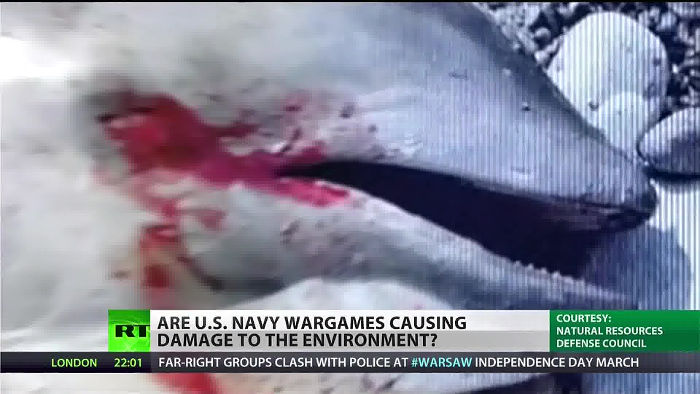Wednesday, April 15, 2015; By David Henkin

On March 31, a federal judge ruled that the National Marine Fisheries Service broke the law when it approved the U.S. Navy’s five-year Pacific weapons testing and training plan. The agency had concluded that the Navy’s [reckless] use of sonar, explosives and vessel strikes would threaten thousands of ocean dwellers with permanent hearing loss, lung damage and death – but approved it anyway.
A single “ping” of the Navy’s most powerful sonar is capable of permanently deafening some whales. According to the government’s own estimates, the Navy’s plan would cause an estimated 9.6 million instances of harm to marine mammals over the plan’s five-year duration.
Earthjustice filed this lawsuit in 2013 in the U.S. District Court of Hawai‘i, representing Conservation Council for Hawai‘i, the Animal Welfare Institute, the Center for Biological Diversity and the Ocean Mammal Institute, alleging violations of the National Environmental Policy Act, Marine Mammal Protection Act and Endangered Species Act.
The National Environmental Policy Act requires that federal agencies consider a range of alternatives to their proposed plans, including alternatives that can reduce the threat of environmental harm. We sued because the Fisheries Service and the Navy failed to evaluate alternatives that would protect biologically sensitive areas from training and testing.
Having failed to require such protections, the Fisheries Service authorized harm to what the court described as a “stunning number of marine mammals,” violating its legal duties under the Endangered Species Act. This law exists to ensure that activities like Navy training would not push endangered whales to extinction. The Fisheries Service also violated the Marine Mammal Protection Act, which serves to prevent harm to marine mammal populations.
The Fisheries Service has already identified vital areas to protect for whales, dolphins and other marine mammals around the Hawaiian Islands and off the coast of Southern California. In 2004, Navy sonar training near Hawaii was implicated in a mass stranding of up to 200 melon-headed whales in Kauai’s Hanalei Bay. Given events like this, it is shocking that the agency gave the Navy free rein to train throughout the Pacific without protecting biologically sensitive areas. …
The court’s decision recognizes that the Navy doesn’t need every inch of the Pacific for training. There is plenty of ocean for the Navy to carry out its mission and also to avoid severe harm to marine mammals by staying out of a small number of biologically sensitive areas.
In January of last year, the organization was sued for violating the Marine Mammal Protection Act after they allowed various underwater activities to carry on as planned, despite knowledge that it would affect millions of marine mammals. They included open-sea bombing drills, sonar training, and gunnery exercises.
“This is an unprecedented level of harm,” Zak Smith, an attorney with the National Resources Defense Council (NRDC), who filed the lawsuit, told the Los Angeles Times at the time. “In order to authorize these impacts on marine mammals, the service had to turn its back on the best available science.”
www.natureworldnews.com/articles/12398/20150130/us-navy-sonar-devices-could-threaten-marine-life.htm
According to Alaska Public Media, the Navy began training in and near the Gulf of Alaska in June of 2015, around the time dead whales began appearing on Alaska’s coastline.
According to the NOAA, man-made sound waves can drown out the noises that marine mammals rely on for their survival, causing serious injury and death. Scientists believe that the sonar blasts cause the whales to change their dive patterns, leading to fatal injuries.
Naval sonar has been shown to disrupt feeding and other vital behavior and to cause a wide range of species to panic and flee. When confronted with naval sonar, whales will leave their local environment, out of fear.
“If the whales are not in an environment with a large enough food supply they will die,” said Paoli.
www.scotscoop.com/49304/featured/dead-whales-point-to-a-bigger-problem/





